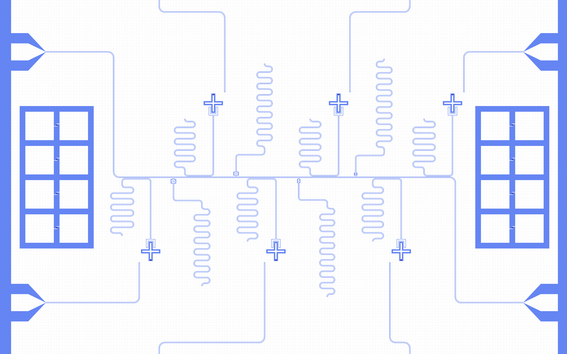IQM announces KQCircuits - An open-source software to design superconducting quantum processors
software tool KQCircuits to automate the design of superconducting quantum processors. KQCircuits is a Python library jointly developed by Aalto University and IQM using the KLayout design program.

Designing quantum processors is fundamental to build quantum computers. But it is a difficult, multi-step process that takes significant time and effort. With this initiative, IQM supports the broader quantum community by open-sourcing its state-of-the-art quantum processor design platform.
KQCircuits creates a community-driven universal platform that enables quantum chip development through a simple and open framework, from chip design and simulation to fabrication. With KQCircuits, quantum engineers and physicists can conveniently generate chip designs with a simple click. They can also check the signal routing before the device fabrication process to avoid making costly errors.
“At IQM, we’ve been using KQCircuits to design and develop our state-of-the-art quantum processors. By making it available as an open-source platform, we want to make our tools available for the entire quantum community. Using KQCircuits, researchers and companies worldwide can now focus on R&D and continue to innovate faster,” said Dr. Johannes Heinsoo, Team Leader at IQM.
KQCircuits generates multi-layer two-dimensional-geometries representing common structures in quantum processing units (QPUs). It includes:
- A framework and definitions of parametrized geometrical circuit elements
- Templates for manually drawn or code-defined circuit elements
- A method for assembling a QPU design from elements.
Also, to reduce the design turnaround time and to reduce manual errors, KQC includes helpers to export:
- Optical mask layouts and lithography patterns
- Project files for easy simulations with popular FEM software such as Ansyss HFSS, Ansyss Q3D, and Sonnet
- Netlist for SPICE simulations.
“KQCircuits leverages the work at KLayout design program, which has a history of over a decade of continuous development. We’d also like to acknowledge and thank the team at the QCD Labs of Aalto University and Mr. Matthias Koefferlein, Open-Source Developer of KLayout,” added Dr. Heinsoo.
” In research, we are always looking for collaboration opportunities and ways to design quantum processors that are of high quality and reproducible. We are extremely happy that our work at the QCD Labs of Aalto University is now continued by IQM. We hope to see other quantum companies and researchers utilize this tool and contribute by further developing KQCircuits,” said Prof. Mikko Möttönen, Aalto University and VTT.
Further information:
Read more news

Apply Now: Unite! Visiting Professorships at TU Graz
TU Graz, Austria, invites experienced postdoctoral researchers to apply for two fully funded visiting professorships. The deadline for expressions of interest is 20 February 2026, and the positions will begin on 1 October 2026.
Hanaholmen’s 50th anniversary exhibition lives on online – making the history of Finnish–Swedish cooperation accessible worldwide
MeMo Institute at Aalto University has produced a virtual 3D version of the anniversary exhibition of Hanaholmen.
Environmental Structure of the Year 2025 Award goes to Kalasatama-Pasila tramway
The award is given in recognition of meritorious design and implementation of the built environment. Experts from Aalto University developed sustainability solutions for the project.






